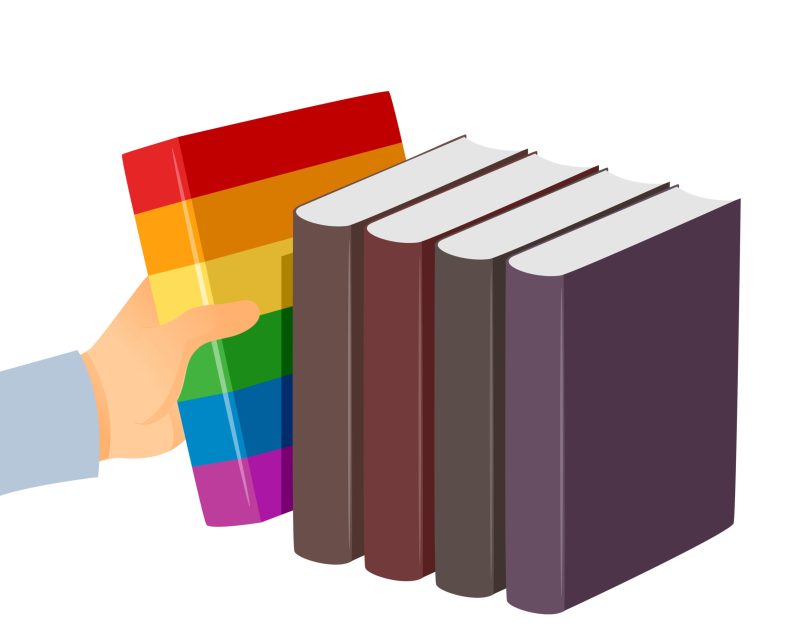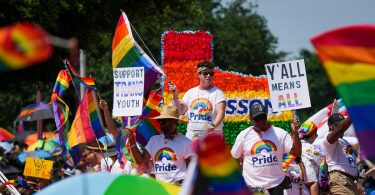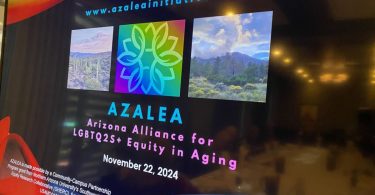October marks LGBTQ History Month, so it’s the perfect time to round up some of 2024’s best new kids’ books about LGBTQ+ history and historical figures.
“The ABCs of Queer History,” by Seema Yasmin, illustrated by Lucy Kirk (Workman). “A is for abundant, because we are many; our histories show we are diverse and plenty,” begins this rhyming volume. Each letter of the alphabet offers one or more words about concepts, events, identities and people that have contributed to queer history. Some of the rhymes and meter bump awkwardly, but the joyful, affirming, diverse and resilient character of the LGBTQ+ community comes through in both the words and the colorful, fun illustrations.
“What I Must Tell the World: How Lorraine Hansberry Found Her Voice,” by Jay Leslie, illustrated by Loveis Wise (Zando Young Readers/Hillman Grad Books). When Lorraine Hansberry was a child, her parents won a landmark U.S. Supreme Court case against housing discrimination, and taught her, “Our stories can change the world.” Inspired by them and the many prominent Black leaders drawn to their orbit, Hansberry sought to find her own voice as a writer and playwright, ultimately realizing that to be true to the stories she wanted to tell, she needed to be true to herself and acknowledge her attraction to women. Newly confident and committed to her vision, she became the first Black woman to have a play performed on Broadway. A powerful and moving biography.
“Glenn Burke, Game Changer,” by Phil Bildner, illustrated by Daniel J. O’Brien (Farrar, Straus and Giroux). Glenn Burke was the first openly gay player in Major League Baseball and the co-inventor of the high five. Bildner shares the story of Burke’s baseball achievements as well as the battle against homophobia that ultimately led to his departure from professional sports. That struggle contributed to his “trouble with drugs and the law,” before he died from AIDS complications in 1995. The compelling biography touches on some tough topics with age-appropriate thoughtfulness while celebrating the life of a changemaker.
“Jimmy’s Rhythm & Blues: The Extraordinary Life of James Baldwin,” by Michelle Meadows, illustrated by Jamiel Law (HarperCollins). Before he was known as James Baldwin, he was Jimmy, growing up in Harlem during the Great Depression. Meadows gives us a lyrical biography of Baldwin from childhood onward, capturing something of the rhythm of his work in her blank verse. This is an outstanding biography, offering young readers just enough detail about Baldwin’s life and importance to inform without overwhelming; incorporating both his Black and gay identities; and honoring his legacy in the rhythm of the text itself.
“Queer History A to Z: 100 Years of LGBTQ+ Activism,” by Robin Stevenson, illustrated by Vivian Rosas (Kids Can Press). Stonewall Award honoree Stevenson brings us a thoughtful and wide-ranging book offering informative and inspiring snapshots of people, movements, events and concepts from U.S. and Canadian LGBTQ+ history, with a focus on those who have helped push LGBTQ+ equality forward. While the alphabetic structure means the topics are not covered chronologically, Stevenson always offers context and clarity and refers readers to other entries as needed. Rosas’ illustrations are bright, bold and contemporary, despite the historical focus of the book, adding to its appeal for tween readers.
“The Queens’ English: The Young Readers’ LGBTQIA+ Dictionary of Lingo and Colloquial Phrases,” by Chloe O. Davis (Simon & Schuster). This young readers’ adaptation of Davis’s book for adults offers definitions of both contemporary and historical terms related to LGBTQIA+ identities and culture, along with insights into their origins and examples of usage. A few terms may skew the volume toward older middle grade and young adult readers (depending on your opinions here), but Davis tries to be thoughtful about her audience. The usage example for “sex,” for instance, involves a student telling their health teacher that they don’t feel ready for sex yet. Overall, it’s an entertaining and informative reference guide.
“Queer and Fearless: Poems Celebrating the Lives of LGBTQ+ Heroes,” by Rob Sanders, illustrated by Harry Woodgate (Penguin Workshop). This compilation of biographical portraits stands out for its use of poetry to convey the meaning and importance of historical and contemporary LGBTQ+ political and social activists, Sanders matches poetic forms carefully with each subject, for example deploying the march-like beat of rhyming couplets to tell of Bayard Rustin, who organized the 1963 March on Washington. A few paragraphs of prose on each figure add details and substance to the emotional connections that the poems create.
“Jane Addams: The Most Dangerous Woman in America,” by Marlene Targ Brill (Ohio University Press). Social activist and reformer Addams was the first American woman to be awarded the Nobel Peace Prize. This biography charts the course of her life and offers readers useful context on society in the late 19th and early 20th centuries. Brill is cautious, however, about Addams’ relationships with Ellen Gates Starr and Mary Rozet Smith, seeing Starr simply as a close friend and colleague and Smith as a “longtime friend and partner,” but also noting, “There has been much speculation about the exact nature of their relationship. Was it romantic or were they good friends?” Other historians have come down more firmly on the side of romance. Despite Brill’s academic caution here, she has given young readers a substantive but readable biography of Addams, whose tireless work deserves to be more widely known.
Newsletter Sign-up







